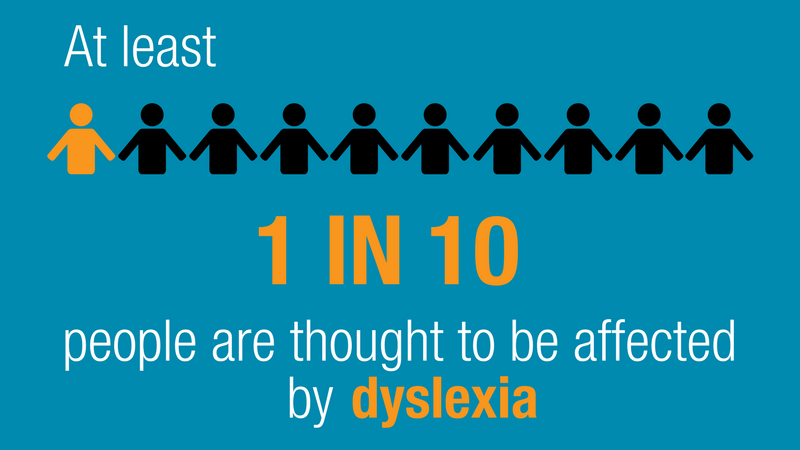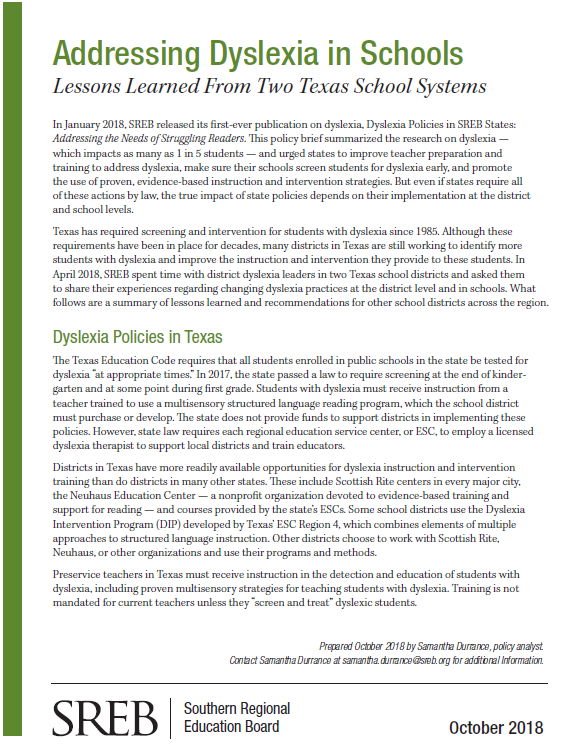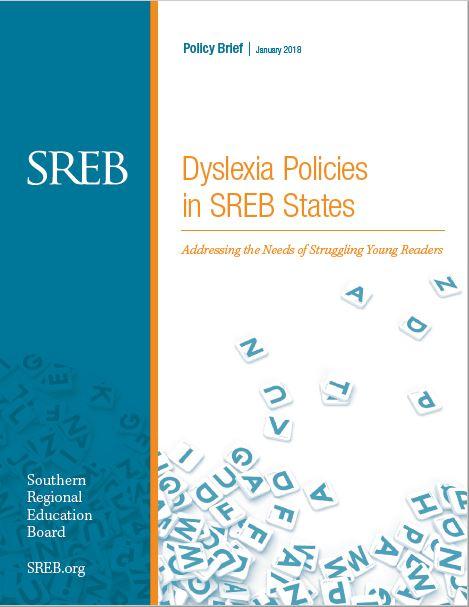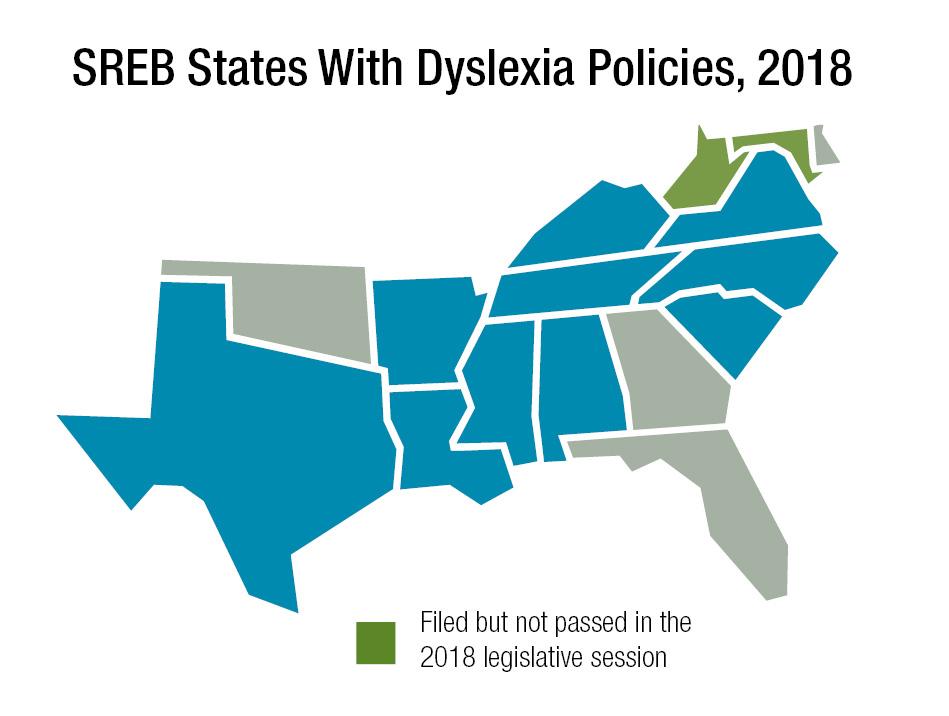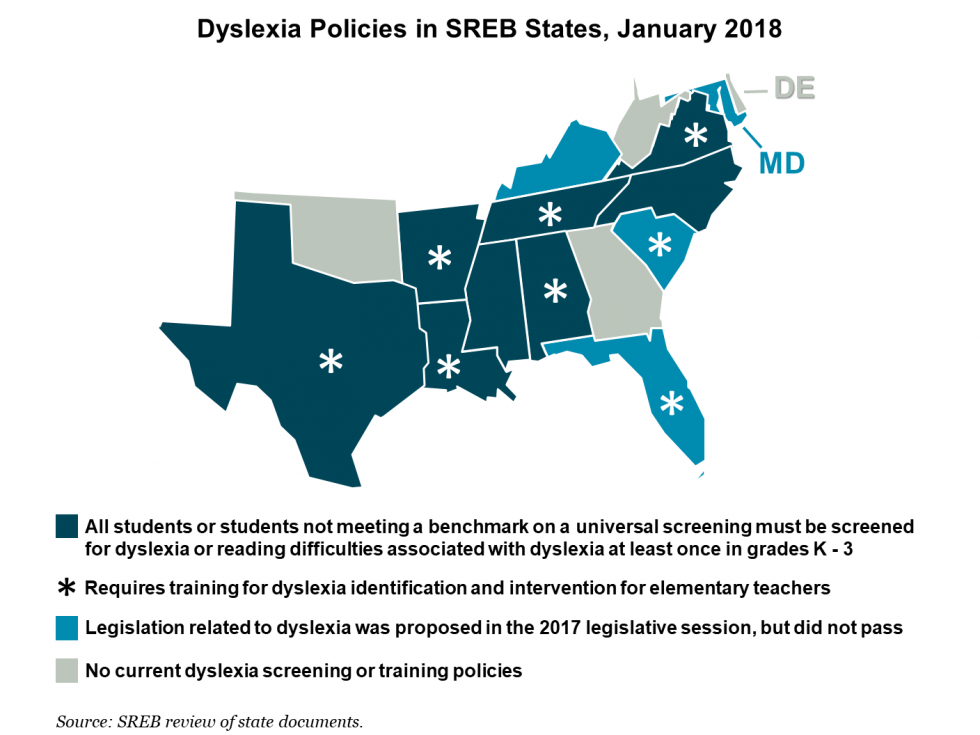Dyslexia
Dyslexia Policies and Resources
Addressing the Needs of Struggling Young Readers
If states can identify more students who face the challenges of dyslexia and provide effective early interventions, they should be able to reduce the proportion of students who perform below grade-level expectations. This in turn will ensure that a greater proportion of all students are prepared for success in fourth grade and beyond.
Free Dyslexia Screening Resources
A number of free screening tools are available to help you determine whether a child has characteristics of dyslexia. If you suspect a child has dyslexia and may need further evaluation, speak with the special education administrator at the child’s school, consult with a psychologist, or reach out to your state’s International Dyslexia Association branch for assistance.
SREB does not endorse any of these instruments.
Assistive Technology for Students With Dyslexia
These assistive technology resources can be helpful for people with dyslexia or individuals with reading, writing or executive function difficulties. Adapted from information provided by Debbie Brineman and Joyce Derr at the Georgia IDA Conference, 2018.
Also useful is Microsoft’s guide to the features of its Learning Tools.
Teacher Training Resources
Resources for evidence-based reading instruction and intervention for struggling readers and students with dyslexia
All students ─ but especially struggling readers and students with dyslexia ─ benefit from structured literacy instruction that explicitly teaches language skills and the essential components of reading. It is also important that all teachers be able to recognize characteristics of dyslexia and know strategies that will help their students.
Resources to Support the Georgia Dyslexia Pilot Districts
In 2020 SREB began working with the Region 6 Comprehensive Center at SERVE to support the Georgia Department of Education and Georgia’s dyslexia pilot program. Part of this support includes producing resources for the pilot districts, which can be downloaded below.
- DOWNLOAD EVIDENCE-BASED LITERACY AND DYSLEXIA RESOURCE
- DOWNLOAD FUNDING SOURCES RESOURCE
- DOWNLOAD STRUCTURED LITERACY RESOURCE
- DOWNLOAD 2019-2020 IMPLEMENTATION ANALYSIS
- DOWNLOAD 2019-2020 EXECUTIVE SUMMARY
- DOWNLOAD KEY GADOE MTSS AND DYSLEXIA RESOURCES
- DOWNLOAD 2020-21 IMPLEMENTATION ANALYSIS
- DOWNLOAD 2020-21 EXECUTIVE SUMMARY
- Read more
State Dyslexia Policies
What does your SREB state say about dyslexia?
Click on your state for information about current state dyslexia policies and links to state-specific resources.
Alabama
Updated 12/16/2020
Addressing Dyslexia in Schools
Lessons Learned From Two Texas School Systems
In April 2018, SREB spent time with district dyslexia leaders in two Texas school districts and asked them to share their experiences regarding changing dyslexia practices at the district level and in schools. This publication is a summary of lessons learned and recommendations for other school districts across the region.
Dyslexia Policies in SREB States
Addressing the Needs of Struggling Young Readers
This brief lays out what researchers know about the learning differences associated with dyslexia, which reading interventions are effective for individuals with dyslexia, and what good state policies can mean for children and their families.
In February 2020 the policy table in Appendix C was updated to reflect policy changes through the 2019 legislative sessions.
DOWNLOAD BRIEF >
DOWNLOAD EXECUTIVE SUMMARY >
DOWNLOAD UPDATED POLICY TABLE
Dyslexia Policy: The Changing Landscape
What does research say about how children should learn to read?
Research shows that beginning readers need to be taught how oral speech connects to written language. In order to understand that, young children must be able to perceive the individual sounds in spoken words — like the /c/ /a/ and /t/ sounds in “cat.” They must also be taught how those individual sounds correspond to written letters and combinations of letters, a skill called phonics. Some children learn these relationships quickly and easily, while others — approximately 40 percent of children — require explicit, systematic instruction.
2018 HSTW Conference Presentation
Supporting Struggling Secondary Readers
Policy Analyst Samantha Durrance presented at the 2018 High Schools That Work conference on supporting struggling readers in secondary schools, especially students with dyslexia.
Attendees left with a basic understanding of dyslexia and how children learn to read, as well as resource toolkits including:
Research Recommendations for Dyslexia Screening and Screening Requirements in SREB States
Early screening for reading difficulties and dyslexia can identify students who need specialized interventions before they fall too far behind in reading. In response to a request for information from a legislator in Kentucky, the first document below summarizes recommendations from current research. It also lists and links to screening requirements in SREB states. Last revised: October 2018.
Don’t Be Afraid to Say “Dyslexia”
Acknowledging and identifying dyslexia is step one in helping struggling readers
Researchers estimate that dyslexia affects at least one in 10 people. As defined by the International Dyslexia Association, dyslexia is a neurobiological learning disability, unrelated to intelligence, characterized by differences in the way the brain processes language. These differences result in difficulties developing skills that are important for reading and writing. While it cannot be outgrown, individuals with dyslexia can learn strategies to help them overcome the unique challenges it presents.


